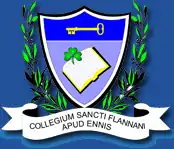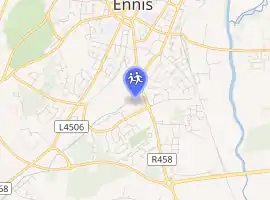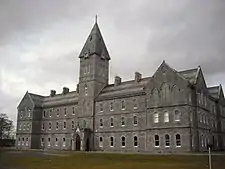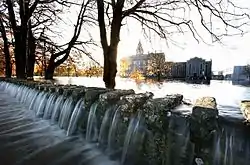St Flannan's College
Saint Flannan's College is an Irish co-educational secondary school located in Ennis, County Clare, which takes its name from the 7th century patron saint of the Dál gCais. Formerly an all-boys boarding school, the first girls class was entered in 2002 and in 2005 the boarding school was closed. In 2003 an extension which added over 20 new rooms to the college was completed. A measure of the expansion that has taken place over the past thirty years is that in 1962, there were some 370 pupils, 140 of whom were day boys. Only 37 teachers were in attendance. By 2004, enrollment had risen to more than 1,001 students. Staff numbers had risen to 60. In September 2002, co-ed classes were introduced in First Year. In September 2003, a new wing containing extensive new facilities was opened. In the 2010-11 school year there were 1,206 students.
| Saint Flannan's College Coláiste Fhlannáin Naofa Collegium Sancti Flannani | |
|---|---|
 Crest of the college(Top) | |
| Location | |

| |
| Information | |
| Patron saint(s) | Saint Flannan |
| Established | 1846 |
| President | Rev. Joe McMahon |
| Principal | Rev. Ignatius McCormack[1] |
| Chaplain | Rev. Damien Nolan |
| Staff | 85 (2011) |
| Number of students | c. 1200 |
| Website | www |
 View of the front of the College | |
History
In 1846, the Diocese of Killaloe lent its prestige and patronage to the private academy conducted at Springfield House, Ennis by a Mr Fitzsimons. Fortified by diocesan support, the school would henceforth function as both a diocesan seminary and as a day and boarding school for Catholic boys. Under this arrangement, the Springfield House school flourished, and by the early 1850s was already enticing pupils away from Erasmus Smith College, College Road. Springfield pupils were conspicuously successful in obtaining scholarships to the Queen's Colleges at Galway and Cork (now NUI Galway and University College Cork). In 1859, Fitzsimons added a new wing to the college in order to cater for the increased number of students. The same year, Springfield affiliated to the newly established University of London as a preparatory college. In 1862, financial difficulties caused Fitzsimons to terminate his connection with Springfield, and under his successor the College changed directions sharply. The affiliation with the University of London was dropped for one with Newman's Catholic University in Dublin. Fitzsimons, for his part, embarked on a new career in Argentina, and within the space of a few years set up four schools. Fitzsimons died there in 1871 during an outbreak of yellow fever.
In 1865 the diocese broke with Springfield altogether and set up a diocesan college completely under its control at #12 Bindon Street, now a solicitor's office, and soon after became known as St. Flannan's Literary Institute, under a clerical headmaster, known for the first time as a president. The following year, the Institute was able to acquire the Springfield premises after the school there closed. After a comparatively short interval, a search was begun to find a site on which a larger college campus could be developed. Work finally began in 1879 on land acquired on the Limerick Road, and the College was built to a rather severe neo-Gothic design. Financial problems occasioned by the bankruptcy of the builder led to alterations in the plans, and some of the finishing touches were postponed, never to be completed. Visitors to the college are often shown such features as the plain uncarved label stops around the Gothic windows and the Clock Tower, with no clock — all now part of the fabric of College tradition.
Perhaps the most famous president of the college was Canon William Kennedy, head of St. Flannan's between 1919 and 1932. During the Anglo-Irish War, the College was a hotbed of separatist sentiment, from where the Canon personally organised the collection of the famous Dáil Loan in Clare. Still preserved in the College are letters from both Éamon de Valera and Michael Collins in connection with this undertaking. Canon Kennedy was arrested in July 1921 by British forces and interned on Bere Island. The early decades of the new state were grim as only limited funding was available for secondary education, and most costs had to be met out from the college's resources alone, but some curriculum development did take place. In 1937, for example, Physics was introduced as a subject for the Leaving Certificate, remaining for many years the only science subject available at that level.

The measure of the expansion that has taken place over the past thirty years is considerable; in 1962 there were some 370 pupils in St. Flannan's (140 of whom were day boys) and only 17 teachers. By 2004, the numbers had risen to more than 1,000 students and staff numbers had risen to 66. In September 2002, Coed classes were introduced in First Year. In September 2003, a new wing containing new facilities was opened.[2] In 2009, the College experienced very severe flooding, with much of the college grounds being submerged and water breaching the perimeter wall because of a small stream that runs underneath the college.[3]
Ranking
St Flannan's was ranked third in Ireland according to one of the most comprehensive league tables, published in The Irish Times, to date. The table was compiled by a research team at the University of Ulster and the Kemmy Business School at the University of Limerick in 2009.[4]
Notable staff
- Gary Brennan - the Clare dual player teaches P.E. and Irish[5]
- Jamesie O'Connor - the Clare hurler teaches business studies[6]
- Willie Walsh - the future bishop joined the staff in 1963
Notable past pupils
- Academia
- Nicholas Canny - NUI Galway Professor Emeritus of History
- Clergy
- Rev. Harry Bohan - priest and former manager of the Clare hurling team
- Rev. Austin Flannery OP - Dominican priest
- Rev. Thomas Flynn - Columban priest murdered in the Philippines
- Bishop Willie Walsh
- Politics
- Sylvester Barrett - former Minister for Environment, Minister for Defence and MEP (Fianna Fáil)
- Michael D. Higgins - Former Minister for Arts, Culture and the Gaeltacht and ninth President of Ireland[7] (Labour Party)
- Tony Killeen - former Minister for Defence (Fianna Fáil)
- Tomás Mac Giolla - former Lord Mayor of Dublin, former TD and former President of the Workers' Party of Ireland[8]
- Michael O'Kennedy - former Minister for Foreign Affairs, Minister for Finance, Minister for Agriculture, and European Commissioner (Fianna Fáil)
- Pat Upton - former Labour TD and Senator
- Sport
- Anthony Daly - Dublin GAA senior hurling manager and double All-Ireland winning captain
- Jamesie O'Connor - Double All-Ireland winner, former GAA TV pundit on TV3, current hurling analyst on Sky Sports
- Davy Fitzgerald - Double All-Ireland winning goalkeeper, All-Ireland winning manager with Clare senior hurling team and current Wexford hurling manager
- Ger Loughnane - All-Ireland winning manager, GAA TV pundit on RTÉ's "The Sunday Game"
- Television
- Maurice O'Doherty - Irish broadcaster best known as a newsreader for the RTÉ News from 1966 until 1983
- Seán Munsanje - TV presenter
- Marty Morrissey - sports presenter
References
- Flynn, Pat (12 June 2017). "New Principal for St. Flannan's Diocesan College". The Clare Herald.
- "St Flannan's College | Ennis | Co. Clare | Ireland". St. Flannans College. Retrieved 10 March 2020.
- "Flooding: worst affected areas". The Irish Times. Retrieved 10 March 2020.
- Flynn, Sean. "High School ranks top in State, says new league table". The Irish Times. Retrieved 10 March 2020.
- Shannon, Kieran (29 May 2016). "Gary Brennan Interview: Still earning rave reviews off Broadway". Irish Examiner. Retrieved 29 May 2016.
- Doody, Derry J. F. (18 January 2017). "JAMES O'CONNOR: Reached The Holy Grail". ScoreBoard Memories Ireland. Archived from the original on 3 November 2018.
James is now in his 23rd year teaching Business Studies at St. Flannans, Ennis, and once again he is embroiled in the quest for Harty Cup honours as one of the college’s coaches and in recent years the Ennis college have achieved great success.
- "The Clare Champion". The Clare Champion. Retrieved 10 March 2020.
- "Final salute to 'giant of the Irish Left' as MacGiolla is laid to rest". independent. Retrieved 10 March 2020.